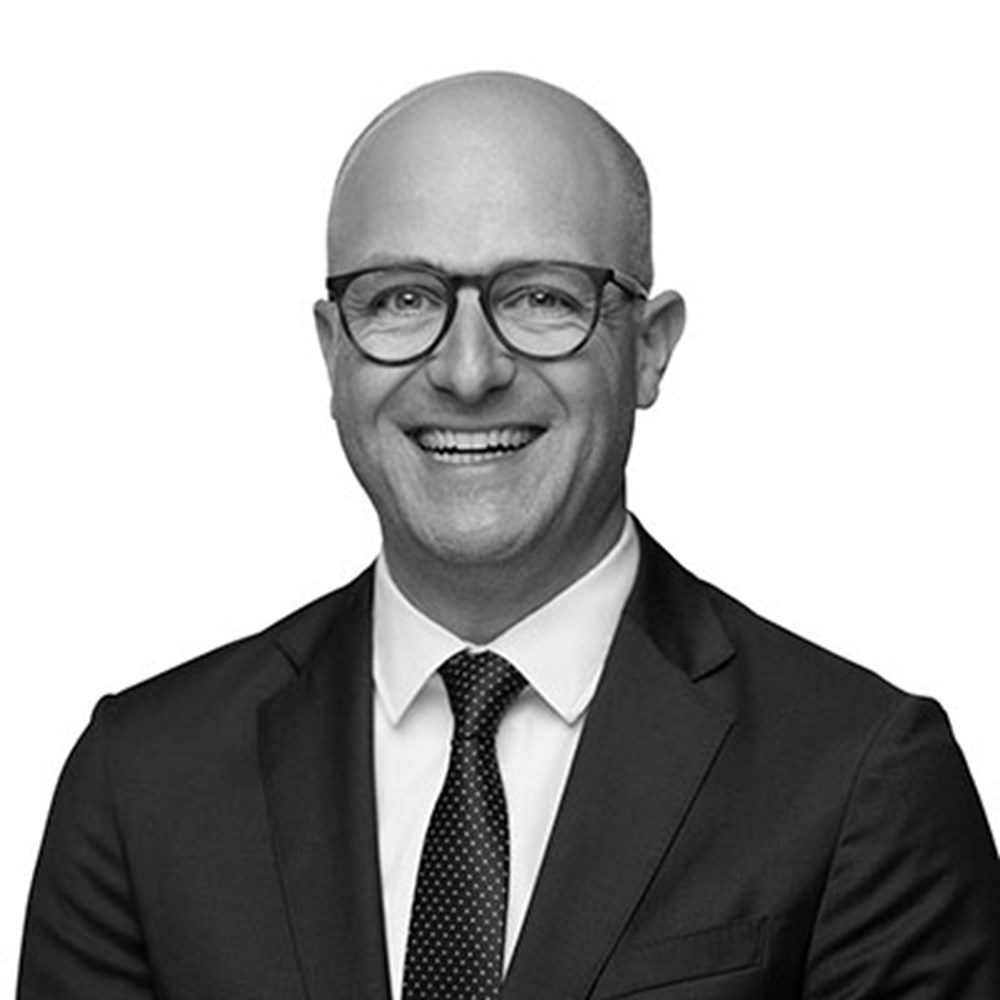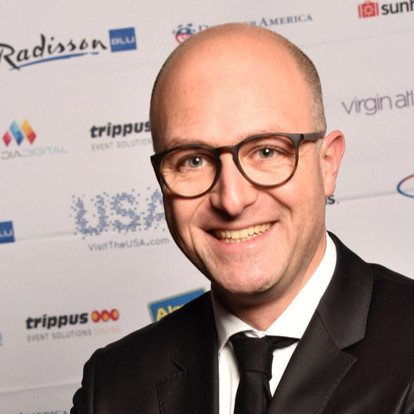In a globetrotting career that has taken him from his native Netherlands to Australia and then to Norway, Jasper Spruit, Avinor Vice President for Traffic Development, has learned a tremendous amount about what it takes to lead in one of the world’s most international industries: aviation.
Jasper sat down with AmCham to share his perspectives on leadership, the importance of aviation for Norway, and how aviation can open doors for Norwegian businesses in economic hot spots such as the United States and Asia.
Where did you start? Can you give us a brief description of your path to where you are now?
I have always been very internationally oriented. While I was receiving my bachelor’s degree in Rotterdam, I had the opportunity to complete a four-month internship in Switzerland with SwissAir. This was my introduction to the aviation industry, and I found it so interesting that I knew I wanted to work in this industry following graduation.
As I was preparing to write my master thesis, I remember going to my professor and telling him that I was not the type to sit in the library all day reading books. I wanted to go to a company where I would have the opportunity to learn a lot more through experience. As a result, I was able to write my thesis for Rotterdam Airport. I stayed and worked there for about 8 months after finishing my thesis, followed by 8 months in a small airline company in southern Netherlands. This company went bankrupt, which unfortunately happens a lot in the aviation industry, so I moved again to another smaller company. I was also in this company for about 8 months before ending up at Schiphol Airport in Amsterdam.
I sometimes say that I completed my own traineeship because I had these 8-month periods at various companies to begin my career. I started as an analyst at Schiphol but after my first few years I became interested in traffic development, which was called aviation marketing at the time.


Traffic development is inherently a very international role because there are only a few airlines from your own country. Therefore, you are constantly working with others around the globe. Schiphol Airport was holding almost 20% of Brisbane Airport Corporation so there was an agreement to share intelligence and knowledge between the two companies. As a result, I had the opportunity to swap places with an employee from Brisbane Airport and move to Australia for two years.
Brisbane Airport was responsible for the Asian Pacific markets and I often like to make a link to Norway. The Asian Pacific has a lot of islands that need a direct aviation transport link in order to successfully do business and make it possible for inhabitants to actually live in these rural places. Similarly, there are places in Norway, especially in the north and along the west coast, that also depend on direct aviation transport.
After Australia, I returned to Schiphol for a few more years before I started looking around for the next challenge. After turning down other offers from abroad and deciding to settle down and purchase a home, a recruiting agency approached me for a position with Avinor in 2015. This position was so interesting that I decided to go for it. I saw the opportunity for growth in the position which was a fantastic step for me.
What are the important decisions you make as a leader of your organization and how do they impact its global presence? Do you have any recent examples to share?
Our traffic development department has an external focus, and my team constantly works with companies and organizations outside of Norway. Therefore, as a leader of the traffic development department, the decisions I make directly impact Avinor’s global presence.
In addition, Avinor is owned by the Norwegian government and Norway is a country with challenging topography and vast distances, and Norwegian businesses are oriented to international markets. These businesses are entirely reliant on aviation, and aviation is also crucial for settlement, travel, the public health service, education, sports, and culture in Norway.
In order to serve both the Norwegian economy and the country’s inhabitants, we must understand how to directly connect to sources of trade, including inbound tourism and the seafood industry. This is one of the reasons our membership with AmCham has been so valuable. Connection with other AmCham members has helped us develop this understanding.
In my opinion, we are in a very competitive arena. When we approach airlines for business, they are able to reach destinations around the globe and have a number of other companies knocking at their door. So, we must be very visible within the industry. My team proactively works to ensure that Avinor is well represented using a B2B marketing strategy. For example, we share insights and business cases that we believe our public (airline network planners) find useful. The goal is to have Norway and Avinor at the top of an airline director’s mind when they make the key decisions on where to place their aircrafts.
We are also able to promote Avinor at global aviation conferences that are held several times throughout the year. At these conferences, we give pitches to a variety of airline companies. This is another great way to increase our visibility within the industry. We will host one of these conferences in Bergen in 2020. We are very excited for this opportunity as it will be yet another way to continue our promotion of Norway and Avinor.

“I believe that today’s leadership is all about people and competencies. A leader’s ability to discern where a person finds their energy, what excites them, and where they excel is crucial to a leader’s ability to help a person reach their full potential.”
Jasper Spruit
Avinor
How do you build team morale and maintain the creativity of a diverse team within an international organization?
We certainly have a very international team. I am Dutch, we have a group that sits here in Norway at Oslo Airport , In total we now have 13 people in the traffic development team, but of course many more throughout Norway are involved. Having working in different time zones is an advantage because it allows us to always have an eye on the markets and make key decisions when needed, but it also makes it more challenging to stay connected as a team.
Fortunately, we meet key decision makers of airlines and other industry partners and gather frequently at international conferences, and the last few years we have been able to spend some time together traveling around Norway. This gives us the opportunity to not only teach them more about Avinor and Norway, but more importantly catch up with each other and stay connected.
Day-to-day we stay connected using Skype and have found a time of day that works for everyone to be online. My leadership style strongly values creativity and team morale. I want my team members to always feel comfortable making decisions and bringing creativity to the table, knowing that it is ok to make a mistake as long as we are able to learn from it and continue to improve individually and as a team
Would you use the same leadership style in a different organization? In a different country? How important is it to tailor your leadership style to your team and environment?
There are cultural differences between organizations and countries, I believe that the reason I am here today is because of who I am as a leader and a person. Adjusting your leadership style probably depends most on the tasks that you are completing. If I were to move to a different country, organization, or even a different department within Avinor, a different leadership style would probably be more suitable, but the core is me and that will always remain the same.
.
Where do new ideas and exciting proposals come from in your organization? Has your international experience helped you ‘think outside the box’ in your organization?
Everywhere. We have created an environment where it is ok, and even encouraged, to bring in new ideas. We are generally very busy day-to-day, so it has often been difficult to find time to sit down and brainstorm as a team. I want to spend more time, maybe once a month, to gather the team to talk through everyone’s thoughts, what we can do to improve and discuss what we see others doing successfully that we can learn from. As I previously mentioned, my leadership style strongly values creativity, and I want my team to feel comfortable bringing new ideas to the table, knowing that it is ok to make mistakes as long as we can learn and improve from them.
The Dutch are often known for being direct, and so am I.When I worked in Brisbane, I was exposed to a new culture and had to adjust to a new understanding of how others were perceiving me. I remember that when I returned to the Netherlands I had to get used to “being Dutch” again. One of the main reasons Avinor likes to employ foreigners is to bring the outside in, so it is my previous experience abroad that brought me here. Therefore, the way my team works today might not be “outside of the box” for me, but it is new to Avinor.
How do you ensure that your team and your company’s services are aligned to your company’s core vision?
In Avinor, it is all about communication and repetition. We use internal presentations to explain to each other the strategy behind the work we are doing.
The repetition of these presentations and blog posts help ensure that everyone at Avinor is aligned to the company’s core vison and strategy. What I like to do, and maybe this is apart of my leadership style, is have other members of my team go and make a presentation when there is a working or strategy group meeting. This way, we have more cross understanding as a team and the message is not always just coming from me but from the team itself.
What do you believe are shared traits among good leaders? Are than any common mistakes you notice leaders making? What is unique about being a leader in Norway compared to leading an organization in another country?
I believe that today’s leadership is all about people and competencies. A leader’s ability to discern where a person finds their energy, what excites them, and where they excel is crucial to a leader’s ability to help a person reach their full potential. I think this was probably different twenty years ago. As a leader you had to carry out a task and that was it, but now everything is more knowledge based – skills require less handwork and demand more thinking.
I often like to look to great leaders to learn from what they are doing successfully. For example, Barack Obama was in Oslo last year, and I think he is a great example of a leader who truly understands the people he works with. He’s able to effectively determine where a person excels and place them into a situation where they can produce their best work. I also think it is important to create an environment of trust. The team spirit should be based on shooting for the best, knowing that is ok to also make mistakes.
A common mistake might be staying in a leadership position for too long. I don’t necessarily mean that leaders should move just for the sake of it but beware of what is best for the team and company. You don’t want to become too repetitive yourself.
I have found that, for me, the stereotypes that people have about working in Norway generally hold true. There is a strong focus on work-life balance and the workplace tends to be relatively casual. I remember the first time I went to the ministry for a meeting I was thinking that I must wear a nice suit and tie as I did in the Netherlands, where it is very formal. When I arrived, I was surprised to see that everyone participating in the meeting was wearing sweaters. However, I think Norway has taught me that this is ok. Why should it make a difference if you wear a suit or not?
If your job was a sport, which sport would it be?
The Tour de France. I think this is a great comparison because the competition is all about endurance and teamwork. If you don’t work as a team, you will never win or be successful, not even for a single day. There is fierce competition so if you weaken up for even just a minute, you can lose a lot. Although endurance is important, it isn’t everything. There are moments when you need to win the sprints. When I look to the aviation industry, I see aspects of our work that require winning the long-haul races that may take three to seven years to complete, but I also see cases where we must win the short-term sprints.

How do you continue growing and developing as a leader?
I have learned that it is important to carefully listen to the feedback I receive from my team, the management, and our customers. This is a great way to find opportunities for personal growth and development as a leader. I remember learning in a training that you should think about who your best leaders have been and what it is that has made them so successful, then you can try to implement these traits into your own leadership style.
Personally, one of my biggest role models has been Øyvind Hasaas, who is currently the CEO of OsloAirport. He has taught me how to effectively lead others while staying dedicated to the goals I want to achieve. I also like to look to other industries and talk with leaders form other organizations to see what I can learn from them. Sometimes, I try totally new things and just see how they work out.
Lastly, I read a lot of books about successful leadership and try to put myself out of my comfort zone in order to reinvent myself.
When it comes to recent developments at Avinor, what are you are excited to talk about?
We have found that Norway has become an increasingly popular tourist destination in the United States, as we have seen the number of Americans visiting Norway double within the last five years. We have also seen a change in the profile of tourists from America. Historically, a majority of the visitors from the U.S. had family or heritage here in Norway, but recently we have seen an increase in tourists who are visiting simply because they are interested in exploring what Norway has to offer. We also know, of course, that many AmCham members are interested in direct flights to Norway so we have spent a lot of time working with Innovation Norway and various airline companies to improve connectivity.
.
You get the podium at Stortinget for 5 minutes, what topic(s) do you address and why?
I would love to talk about the importance of aviation here in Norway, but at the same time I know that this is an unnecessary topic because the Norwegian government is already educated and recognizes that it is important. Therefore, I would focus on the importance of global aviation for Norway. Currently, the focus seems to be mainly domestic. How do we get connectivity all throughout Norway? While I do agree that this is important, I believe that we need to also focus on the next steps. How do we connect the Norwegian economy to the leading economies around the globe? For example, when flying to Asia from Norway, you can only fly direct to Bangkok and that’s about it. Although we can reach Thailand, there should be direct links to the economic powers of Asia such as China, Japan, Korea, and Singapore. A similar situation is also seen in the United States.
.
Where do you see yourself and your company five years from now?
I am driven to make our traffic Development team, the leading team in the industry of traffic development. We have made quite a few big steps, but we are not there yet. At the past four national conferences we have been nominated by our customers and airline partners to win best team in the industry but have never ended in first place. My goal is to win this award with the team at least once within the next five years. Personally, I have the ambition to make the step into executive management in the future.
A very important topic for Avinor is sustainability. Our near-term goal is to halve our emissions by 2022 compared with 2012, and we have just stated that by 2030 our own operations will be net zero emissions. Avinor is investing with various partners in green aviation. Not only on the ground but we also believe in electrification of flying and thus aircraft.
If you could give your 20-year-old self some advice, what would it be?
Be more patient. That is something I have learned of the last few years, things will come. Also, do what you enjoy and what you gain energy from and the rest will follow. If every morning when the alarm rings you can jump out of bed and be excited for what the day brings, I believe everyone can go quite far.
What do you see in the next generation of leaders aspiring to run an international organization? Do you have any advice for them?
Learn about yourself. If you know yourself well and are connected to who you are as a person, it is a lot easier to be a successful leader and you will end up learning more along the way. Also, make sure you take the time to appreciate the people you interact with and those who help you succeed throughout your career.
What was the latest time you responded to an email last night?
Probably around 6 or 7.
Manage Cookie Consent
We use cookies to optimize our website and our service.
Functional Always active
The technical storage or access is strictly necessary for the legitimate purpose of enabling the use of a specific service explicitly requested by the subscriber or user, or for the sole purpose of carrying out the transmission of a communication over an electronic communications network.
Preferences
The technical storage or access is necessary for the legitimate purpose of storing preferences that are not requested by the subscriber or user.
Statistics
The technical storage or access that is used exclusively for statistical purposes.
The technical storage or access that is used exclusively for anonymous statistical purposes. Without a subpoena, voluntary compliance on the part of your Internet Service Provider, or additional records from a third party, information stored or retrieved for this purpose alone cannot usually be used to identify you.
Marketing
The technical storage or access is required to create user profiles to send advertising, or to track the user on a website or across several websites for similar marketing purposes.
tel.: +47 22 41 50 10 | amcham@amcham.no | Sitemap | Privacy Policy | Designed by Flagship
AmCham © 2025
